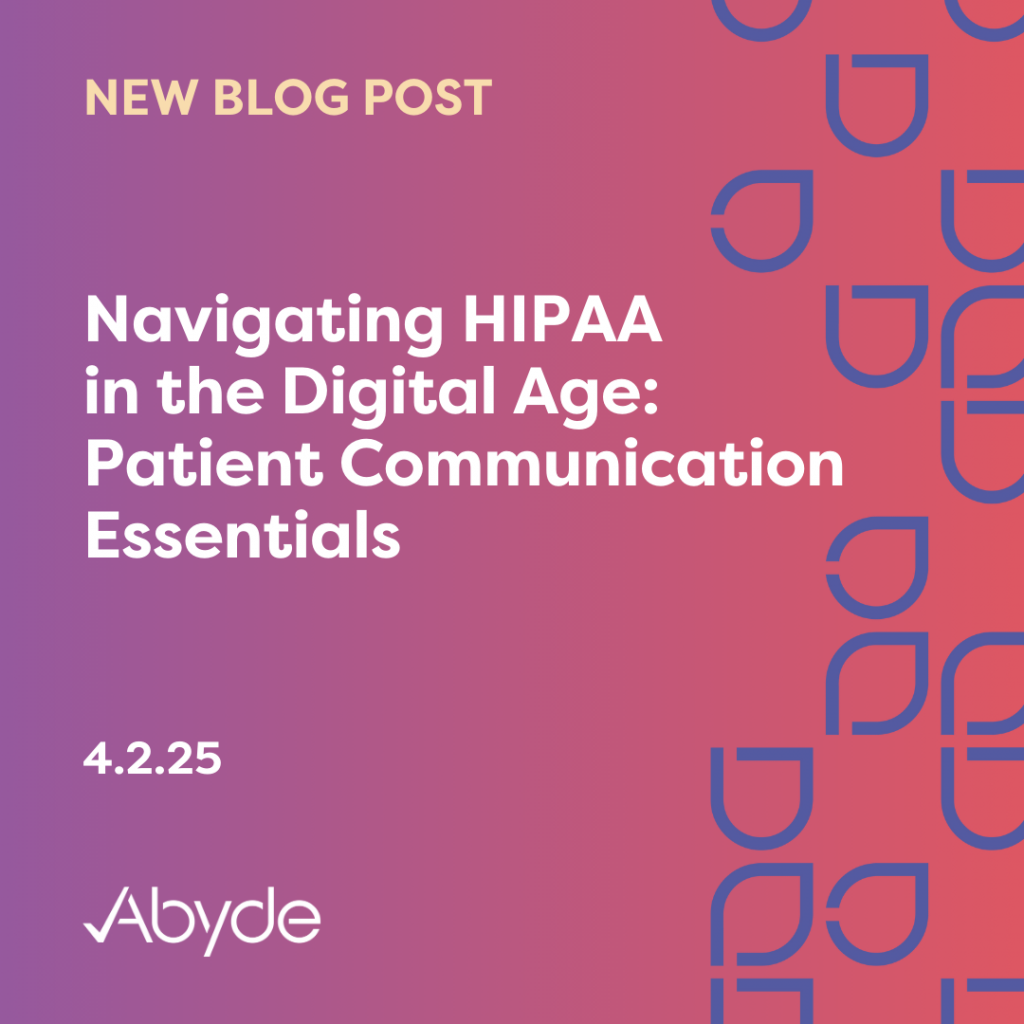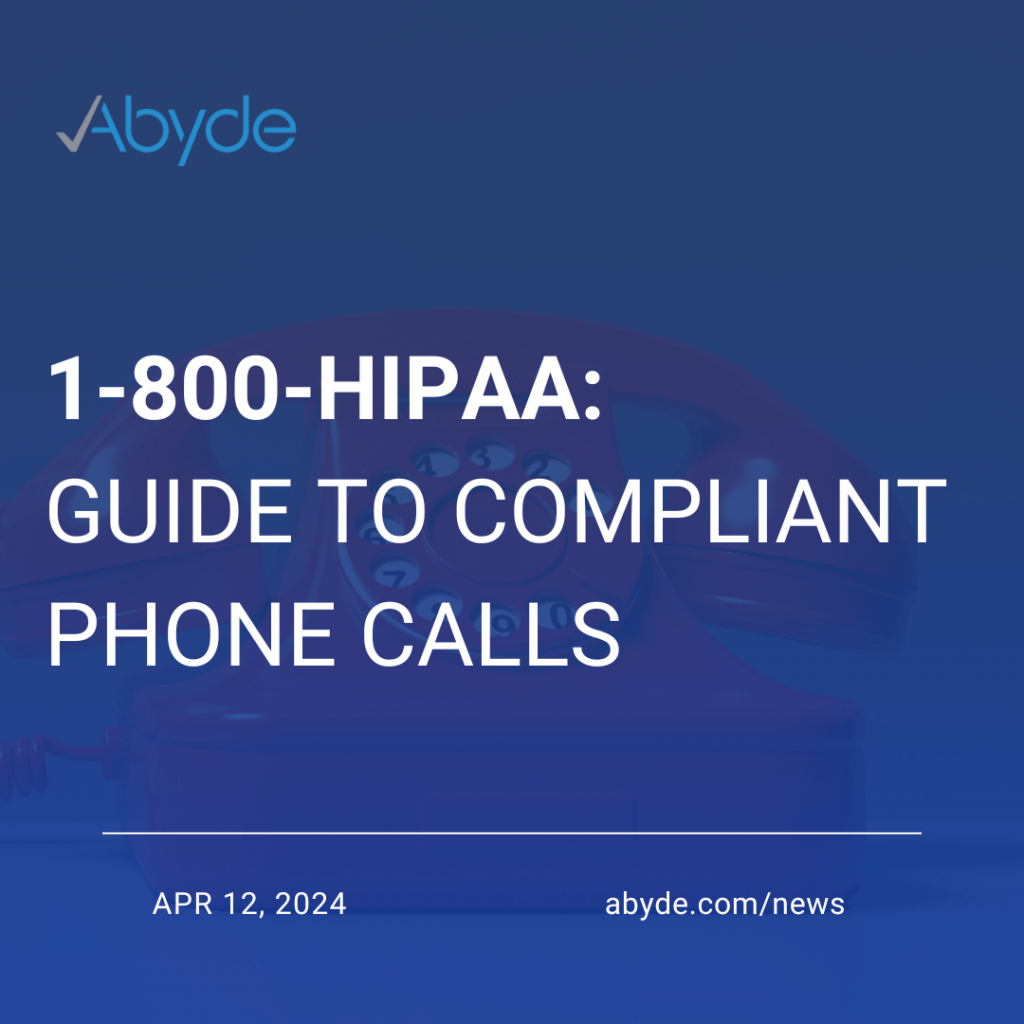April 2, 2025 When 80% of patients prefer digital communication, exploring this opportunity to better serve your patients is crucial. In the digital world, it’s easier than ever to connect with others and build relationships with others through technology. Connecting with patients via technology is simple, but practices must ensure that all communication, including emails, texts, and calls, adheres to HIPAA regulations. What is HIPAA-Compliant Communication? HIPAA, or the Health Insurance Portability and Accountability Act, is focused on ensuring the security of patients’ Protected Health Information (PHI). PHI includes anything personally identifiable about a patient, including Social Security Numbers, full names, addresses, medical history, and more. When communicating with a patient, it’s vital to implement the proper protocols to keep patient data safe. When patient data isn’t secured through traditional channels, using a regular phone doesn’t cut it. For instance, channels need to be encrypted, providing extra layers of protection. Additionally, it’s important to communicate with patients using the minimum amount of information necessary for a conversation. For example, if a patient texts asking to reschedule an appointment, a practice should offer new times and not go in-depth about a patient’s medical history. Communication should remain brief and focus on justifiable reasons to talk to a patient, like scheduling, post-op instructions, and test results. Patients need to consent to different forms of communication, like texts. The practice is responsible for receiving consent when a patient begins seeing a practice. How can I Implement HIPAA-Compliant Communication? An encrypted communication service is the easiest way to ensure secure communication channels. As communication with patients has become normalized in the healthcare industry, numerous organizations offer HIPAA-compliant communication systems. These systems include compliant and encrypted end-to-end phone calls, texts, and emails. Ensure these companies also do their due diligence and sign a Business Associate Agreement (BAA) with your communications provider. Once a suitable communication system is in place, training staff on communicating effectively and safely with patients electronically is crucial. Staff should be well-versed in the proper procedures for digital patient communication. This includes understanding the Minimum Necessary standard, carefully reviewing messages before sending them to patients (especially to ensure information is being sent to the correct patient), and recognizing phishing scams to verify the authenticity of communications before responding. What’s Next? Communicating with patients leads to a more successful practice, with higher attendance rates and more engaged patients. Digital communication is the future, and with the right tools, you can easily navigate HIPAA-compliant communication. In addition to using digital communication systems, implementing a smart software solution is key to a compliant practice. A centralized compliance hub allows you to easily see your vulnerabilities and organize vital documentation, like BAAs with third-party vendors you may use. Looking to learn more about how you can make your practice more efficient while still following rigorous HIPAA laws? Schedule a meeting with a compliance expert today.
1-800-HIPAA: Guide to Compliant Phone Calls
April 12, 2024 Brrring Brrring Brring! It’s your friends from Abyde calling! Pick up! We have some worthwhile tips and tricks to share with you today. While we all love a good chat on the phone when working with Protected Health Information (PHI), it’s key to keep things confidential. That’s why today, pick up our call and learn how your practice can make compliant phone calls. By following our tips, you’ll be a confident phone pro, ready to chat with patients while keeping their privacy a top priority. So, are you ready to answer? Let’s get started! Hello, it’s HIPAA In the digital age, there are numerous ways to connect and share information with patients. Reaching out to patients through the phone is still a common practice, but you need to be able to navigate it safely. First, ensure your phone systems are HIPAA-compliant before sharing any PHI. This includes end-to-end encryption, user authentication, audit control, automatic log-off, and other strong security features. When onboarding with a cloud-based phone service, make sure a Business Associate Agreement (BAA) is signed with the provider, ensuring accountability and liability when it comes to the protection of patient data. Listen, we know you might be itching to chat after your visit – you genuinely care about our patients and their well-being, but there aren’t a ton of reasons to call a patient. While HIPAA restricts casual chit-chat, some of the reasons to call a patient include: Additionally, if you are calling a Business Associate (BA), make sure a BAA is signed before communicating any PHI through the phone. When in Doubt, Leave it Out! When on the phone with a patient or a BA and you’re disclosing PHI, the Minimum Necessary Requirement is at play. As in the name, this standard means only the minimum necessary information about a patient’s health information should be disclosed. FCC, or the Federal Communications Commission has come out and given guidance on HIPAA-compliant phone calls. Keep it short and sweet! Phone calls should be less than 60 seconds or less than 160 characters in text length. And, don’t blow up any patient’s phone with calls! The FCC says patients should only receive three calls a week, or one text a day. To ensure patient privacy and clear communication, keep calls brief and focused. Before sharing any information, take a moment to verify the patient you are speaking with. Phoning Family While it’s only normal for a family to worry about a patient’s health, sharing this information is a different story. Under HIPAA, the patient has to agree for their PHI to be shared with family. Once again, only the minimum information required can be shared. However, if a patient is incapacitated, PHI can be shared with the family if it’s considered in their best interest. Once a patient is lucid again, the patient can retract permission for PHI to be shared with family. Dialing Up Patient Trust Phone calls are a common and effective way to quickly share information with patients. Like anything regarding PHI, it’s vital to stay compliant, keeping patient information secure. By properly handling phone calls at your practice, you’ll strengthen patient trust, improve communication, and reduce compliance risks with the right tools. Abyde can be one of those trusted tools, being a cloud-based solution that streamlines the compliance process. Abyde will assist you in having everything you need to be compliant, keeping you in check and creating a culture of compliance at your practice. To learn more about what your practice needs to do to be compliant, email info@abyde.com, call us at 1.800.594.0883, and schedule a consultation here.

